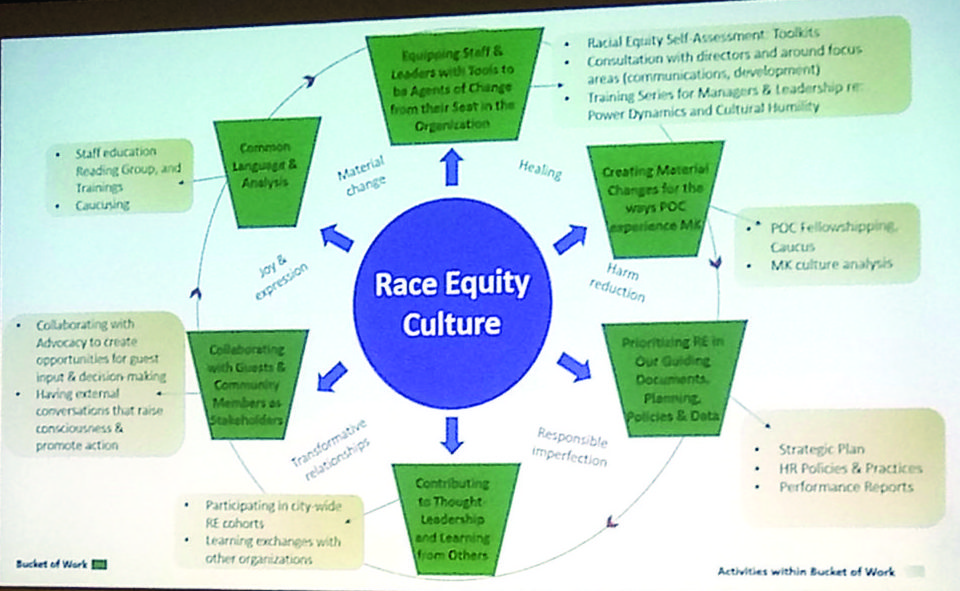On July 23, we attended a session on racial equity at the National Alliance to End Homelessness conference at the Marriott in Woodley Park. For the last few years, the Alliance has been putting together plenaries that are aimed at helping to combat racism and promote racial equity. This year, there was a panel aimed at helping organizations reposition themselves with a racial equity lens.
LaCheryl Porter, the chief operating officer at St. Joseph Center in Venice, California, described disparities she experienced as an employee. ”A lot of times I was the only colored person in the room,” she said.
Porter went on to describe racial disparities in the U.S. “How did we get here?” she asked. “We have to talk about racism.” St. Joseph Center started operations in 1976 with a staff of around 30 and has grown to 300 staff members serving 10,000 people a year with outreach, advocacy, housing, and more.
Porter spoke about the racial disparity at the board and staffing levels in many nonprofits that help homeless people. One way the Center is working to improve racial equity is by making sure its job descriptions don’t go beyond the jobs they are for. For example, an outreach worker or intake person doesn’t need to have a bachelor’s or master’s degree to apply for a job. The Center is also trying to recruit from areas they serve by having job fairs in those communities to get qualified applicants, preferably people of color who live in the communities.
“Really think about what’s important,“ Porter said. “Go to people and say: ‘We value you.’ Racial equity in an organization is a continuous process. The benefit is that our clients see someone who looks like me. Part of our mission is empowerment.”
“There are a lot of challenges,” said Brittney Washington, a senior caseworker at the D.C. nonprofit Miriam’s Kitchen. “Organizations should proactively combat racism internally and externally.”
Washington suggested that organizations be collaborators with guests, members of the community, and other stakeholders. “We all have skin in the game when it comes to racial equity,” she said. Washington also suggested that organizations start “employing a strategy that solves immediate needs but also the systems that create homelessness, like racism.”
Chandra Crawford, a program and policy analyst for the National Alliance to End Homelessness, said the Alliance now aims to have racial equity integrated into every discussion on homelessness. She said while the organization is specifically focused on addressing inequity in the homelessness system, it is still involved in larger movements of addressing historical racism and feeder systems, such as the criminal justice system.
Within the community, “racial equity” is now referred to frequently enough to be considered a buzzword in the poverty industry. But with organizations repositioning themselves, there is the potential to make great headway in the fight against racism in America, especially given the incredibly high level of homelessness among people of color.
At a July 24 plenary, Jemine Bryan, deputy assistant secretary from the Office of Special Needs at HUD, spoke of HUD’s commitment to Housing First programs. The National Coalition for the Homeless has been advocating in support of Housing First programs to the House and Senate for years. (Disclosure: James Davis is a member of the National Coalition for the Homeless’s speakers’ bureau)
Bryan also spoke of a systematic effort to ramp up affordable housing production and protection of equal access for all. She noted that LGBTQ communities are over-represented in homeless populations and said racial disparities must be addressed.
During the July 23 plenary, U.S. Interagency Council on Homelessness Executive Director Matthew Doherty also outlined the increased risks the LGBTQ community faces. He also insisted on Housing First practices and emphasized the need to make people feel safe and welcome in support systems, regardless of their identities and the composition of their families.
Brianna Bilter contributed reporting.




